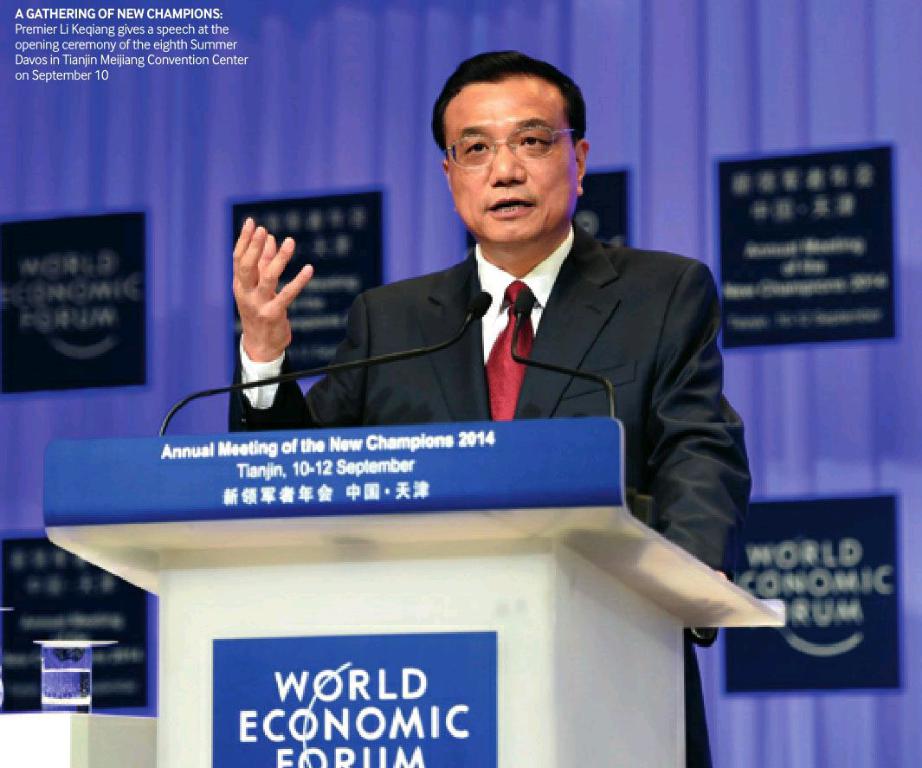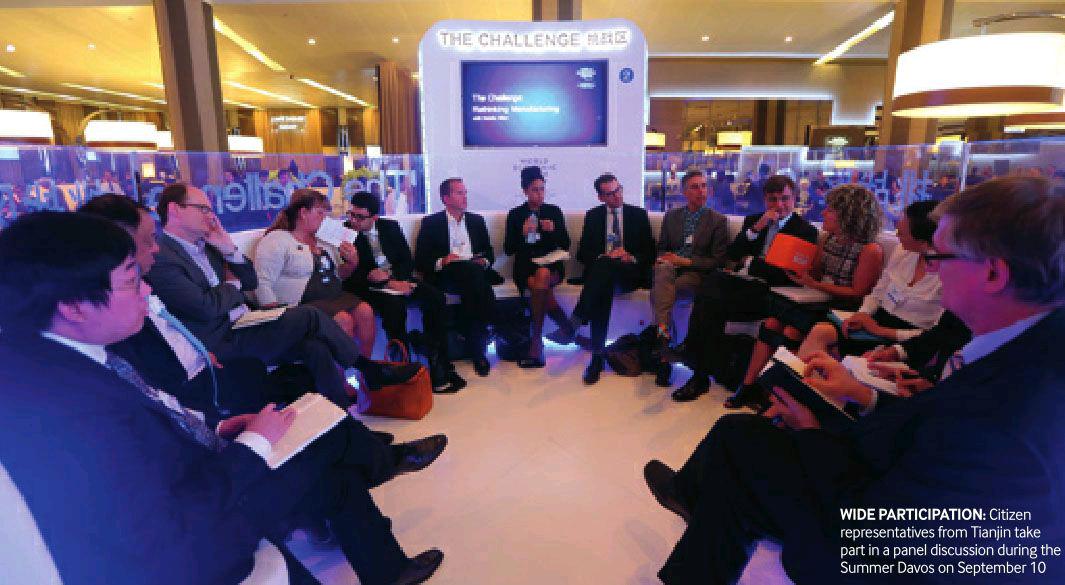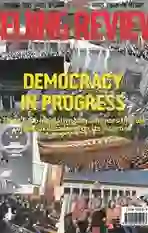Is a Reemerging China in the Cards?
2014-10-11ByDengYaqing
By+Deng+Yaqing
Inside a gargantuan wave-roof building in Tianjin, a coastal city in north China that combines Chinese and Western elements, political leaders, business elites and economists from all over the world recently spoke their minds on economic issues that have generated plenty of public concern. This was the host venue of the World Economic Forums Annual Meeting of the New Champions 2014, also known as the Summer Davos, which ran from September 10 to 12. With the theme of Creating Value Through Innovation, the forum concentrated on the ongoing and upcoming changes confronted by the global economy, especially the Chinese economy.
“Innovation is vital to the steady recovery of the world economy. Its also essential to upgrading the Chinese economy and improving its performance,” said Chinese Premier Li Keqiang at the opening ceremony on September 10, attributing Chinas steady and sound growth in recent years to reform and innovation.
As the global economy continues recovering at a fairly moderate pace, almost 90 percent of the emerging market had witnessed a slowed growth in the past 18 months, according to Zhu Min, Deputy Managing Director of the International Monetary Fund. In the first half of the year, the Chinese economy registered a 7.4-percent growth rate, close to the 7.5-percent target and still within the proper range.
Despite a slowdown in economic growth, from January to August this year, the registered unemployment rate stayed at around 5 percent in 31 large and medium-sized cities; more than 9.7 million urban jobs were created, which is 100,000 more compared with the same period last year, according to Premier Li.
After three decades of explosive growth, the once miracle maker now seems to have entered a period of transition. “As the old two engines of growth—export and real estate–are gradually phasing out, new ones are coming in, which explains the current economic slowdown,” noted Li Daokui, Dean of the Schwarzman Scholars Program at Tsinghua University.
As a matter of fact, the Chinese Government has launched several policies in hopes of spurring structural upgrading, ranging from streamlining administration and delegating powers to the lower levels, to adopting measures such as cutting the reserve requirement ratio for certain banks and reducing taxation on small and microbusinesses.
“The current slowdown is temporary. Now, the Chinese economy is going through a U-shift adjustment. If the reforms are successfully carried out, GDP growth will be able to recover a little bit,” said Li, arguing that Chinas GDP is only equivalent to 19 percent of that of the United States, posing tremendous potential for further growth.
Reforms
“A key question for policymakers is what structure to reform,” argued Zhu, pointing out that each and every sector of the economy, such as infrastructure construction, the labor market and pensions, needs a specific plan, not a general conception.
In fact, steps have been quickened to boost the service industry. In the first half of the year, the number of newly registered service businesses surged by more than 70 percent and the service industry outperformed the manufacturing industry in terms of growth rate and share of GDP, said Premier Li in his speech at the opening ceremony.
Li Daokui believes the new growth engines consist of consumption-based infrastructure investment, private consumption, and the greening up of production capacity from steel, petrochemical industry to power generation.
In the first half of the year, the growth in investment and production of industries with high energy consumption and emissions noticeably slowed down, the per-unit GDP energy consumption dropped by 4.2 percent year on year, and carbon intensity was cut by about 5 percent, the largest decline in the past few years, according to Premier Li.
Beyond that, the country is also prepared to embrace a bottom-up reform featuring endeavors to reform state-owned enterprises (SOEs). As early as February, Chinas largest state-owned oil-refining company China Petroleum & Chemical Corp. (Sinopec) took the initiative to open up its domestic marketing and distribution operations to private investors.
“SOEs reform does not just mean the introduction of mixed ownership. In fact, the diversification of shareholding has been in progress since 1984, and now its promoted more as a main model making up Chinas basic economic system,” said Fu Chengyu, Chairman of Sinopec.
Fu argued SOEs should build up their core competitiveness as private companies do, and the recipe is to expose themselves to the market and de-administration. In other words, the reform doesnt mean the elimination or privatization of SOEs, but the modernization of the corporate governance system.
“All the companies should be thrown into the sea of the market, in which they would elbow to win favor from consumers by virtues of high quality and advanced technologies,”said Dong Mingzhu, President of Gree Electric Appliances of Zhuhai, noting that excessive administrative governance would severely undermine the long-term viability and growth of enterprises.
Innovation
In his speech at the opening ceremony, Premier Li laid an emphasis on promoting institutional innovation as well as innovation in science and technology, and expressed confidence in Chinas innovative potential.
“Just imagine how big an innovation force it could be when the 800 million or 900 million workers among the 1.3-billion population become enthusiastic about entrepreneurship and innovation,” he said, proclaiming it the fuel of sustained economic development.
China ranks 28th in the Global Competitiveness Report 2014-15, holding the lead among the BRICS (Brazil, Russia, Indian, South Africa and China), partly because of its favorable environment for entrepreneurship and innovation, which will continue to top the agenda of Chinas development in the days to come.
To give more space to entrepreneurship and ensure that the blood of innovation can filter into the social fabric of China, the government hopes to complete the task of removing and delegating items subject to government approval within a two-year period.
In addition to streamlined administration, institutional improvement is also underway. A list of administrative powers, which defines the scope of what government should do, will be published to prevent the abuse of power; a negative list, which defines areas off-limits to businesses, will be formulated to increase transparency and fully unleash the vitality of enterprises; and a list of government responsibilities, which defines how the government should regulate the market, will be put in place to expose its actions to public scrutiny.
The three lists supplement each other and will ensure the legitimacy of government power, the transparency of corporate innovation and the rationality of market competition, said Xin Ming, a media commentator.
Opening wider
Anti-trust probes into foreign companies such as Microsoft, Qualcomm and Audi have sparked some criticisms over possible discrimination by Chinese authorities. However, statistics show that since Chinas Anti-Monopoly Law went into effect on August 1, 2008, the number of foreign enterprises investigated has only accounted for 10 percent of the total.
“China opposes protectionism in all its forms or any trade war and advocates the building of an open, fair and integrated global market,” said Premier Li, confirming that China will continue to pursue a more proactive strategy of opening up.
Klaus Kleinfeld, Chairman of Aluminum Co. of America, said Premier Lis speech helped to dispel the worries of foreign corporate leaders and boosted their investment confidence over their future development in China.
“Since anti-monopoly is in the interests of consumers, it will exert a positive influence,”said Li Zhen, President of E. J. McKay, a leading Chinese investment bank.
As one of the parties involved in the antitrust torrent, Paul Jacobs, Executive Chairman of Qualcomm, also expressed the companys willingness to reach win-win cooperation with its Chinese partners. Given its constantly growing economy, strong consumer demand and abundant cooperation opportunities, China will continue topping the list of Qualcomms overseas investment destinations.
In addition, to strike a balance between promoting economic development and opening up, China is trying to unveil a management model of pre-establishment national treatment plus a negative list by first carrying out a pilot test in China (Shanghai) Pilot Free Trade Zone.
Zhang Xiaoqiang, Vice Chairman of the China Center for International Economic Exchanges, suggested the new model is likely to shepherd more foreign investors into Chinas service industry.
“Overseas companies will find more opportunities on offer in a number of emerging industries, such as energy conservation and environment protection services, new energy and high technology,” said Zhang.
Key Points of Premier Lis Speech
We will accelerate the pace of institutional innovation.
Chinas innovation involves not only technology but more institutional, management and growth models. Chinas reform and opening up for the past three decades and more has in itself been a huge driver of innovation, and the huge, untapped potential of innovation and development in the future still lies in institutional reform.
The government will continue taking the lead in conducting a “self-targeted revolution.”
We will deepen the reform in the administrative approval system. We hope to complete the task of removing and delegating items subject to government approval, originally planned for five years, in a shorter period of time, so as to unleash the potential of the market and the driving force for development.
We should provide a list of government powers that defines the scope of what the government should do, so as to prevent the abuse of government power, reduce rentseeking and ensure that the government better performs its duty of serving the people.
A negative list should be formulated that defines areas off-limits to businesses, so that we can build open and transparent systematic arrangements with stable expectations and bring about enterprises vitality to the fullest extent.
We should also formulate a list of government responsibilities to define how the government should regulate the market, to build and sustain a market environment that favors honest operations and fair play, energizes businesses and encourages innovation and creativity.
We will step up science and technology innovation.
We will support and provide guarantee to certain sectors and curb and scale back some others, cultivate and promote new products and new businesses and speed up the development of service, hi-tech and emerging sectors.
We will phase out overcapacity, accelerate the transformation of traditional sectors and eliminate outdated capacity so that Chinese products and Chinas service sector can move up the global value chain and more value could be created through innovation.
We must invest more in human capital and increase the ranks of high-caliber workers. We will improve the technological sophistication, quality and brand awareness of Chinese industries. In particular, we need to step up reforms to remove restraints on innovation by individuals and companies.
We will promote a people-centered, new type of urbanization, which in itself is the biggest structural readjustment.
We will seize opportunities brought about by technological advances and global industrial revolution to speed up the development of such schemes as “broadband China”and “smart cities,” leverage the role of cities across the country in galvanizing hinterland development, promote urban-rural integration and a gradient development of different regions and bring about a synchronized progress of the new type of industrialization, IT application, urbanization and agricultural modernization.
We will vigorously develop programs related to peoples wellbeing, promote equal access to basic public services and strengthen social security, including providing security to those who failed in their entrepreneurial endeavor to help them restart businesses.
We will continue to increase household consumption and ensure that greater internal demand can serve as a new power to drive economic growth.
It is imperative for us to enhance energy conservation and environmental protection.
Tackling climate change is not only our binding international obligation as a responsible major country, but also a pressing need for our own development. We have declared war on pollution and earnestly fulfilled our due international responsibilities.
We are studying the action targets on greenhouse gas emissions control, including the peak of CO2 emission, the carbon emission intensity reduction and the increase in the share of non-fossil energy by 2030 and beyond.
(Source: Xinhua News Agency)
